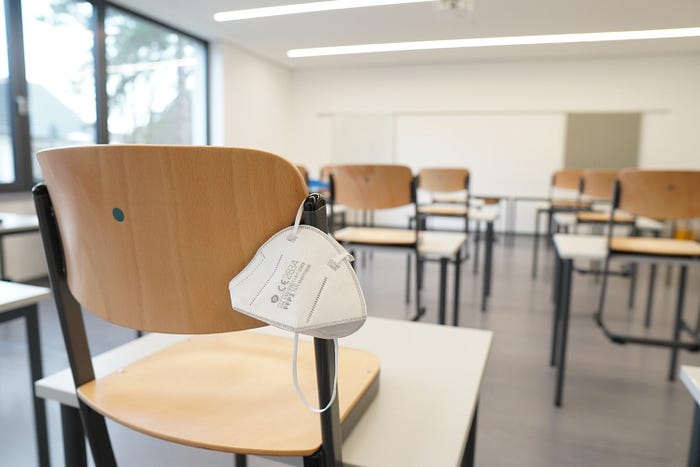"Not it."

According to the most recent national test results, extended public school closures erased 20 years of educational progress.
“What Will It Take to Restore the Social Contract on Public Schools?” wondered the New York Times on September 22, 2022.
The implication — that the social contract on public schools has indeed been broken — isn’t lost on readers of the NYT, not a publication known for conservative sympathies.
“Parents who are essential workers had to choose between their jobs and public schools,” the NYT mentioned pointedly, raising an issue particularly irksome to working parents who considered teachers’ work at least as essential as their own.
The tenacity of some U.S. districts in holding on to extended school closures has many Democrats on defense. Some former proponents are now regretting their support of extended public school closures.
“I’m a doctor,” prefaced Dr. Leana S. Wen for the Washington Post on August 23, 2022: “Here’s why my kids won’t wear masks this school year.”
Dr. Wen, who was a very vocal proponent of long-term public school closures, mandates, masking, et al, lost faith in these measures once Omicron hit.
“Everything changed last winter, with the arrival of omicron,” wrote Wen. “This variant is so contagious — with its derivative strains such as BA.5 even more so — that preventing covid-19 became nearly impossible.”
“It became clear that the goal I’d hoped for — containment of covid-19 — was not reachable,” Dr. Wen concluded, sadly if somewhat belatedly. “This coronavirus is here to stay.”
“I was willing to limit my children’s activities for a year or two but not for their entire childhood,” wrote Wen.
“Masking has harmed our son’s language development,” Wen noted without irony, “and limiting both kids’ extracurriculars and social interactions would negatively affect their childhood and hinder my and my husband’s ability to work.”
“America has a problem,” wrote Jill Filipovic for CNN on September 6, 2022. “We, my fellow progressives, must admit it.”
“As American students return to school, it’s time to admit we have a problem,” began Filipovic. “Thanks to Covid-related school shutdowns, our school children have suffered unprecedented learning losses, with 9-year-olds seeming to have lost some two decades worth of progress on math and reading skills, according to new test results from the National Assessment of Educational Progress.”
“The backtracking was particularly severe for the students who were already struggling, as well as for Black and Hispanic students,” noted Filipovic. “And, for many students, it may simply be too late to make up such significant setbacks.”
“This should make the progressive-minded among us who supported school closures pause and ask ourselves if we got this one right — and what we could learn from this whole debacle,” Filipovic advised.
So who was responsible for extended public school closures in some U.S. school districts?
“Randi Weingarten Flunks the Pandemic,” accused the Wall Street Journal editorial board on September 1, 2022. “National test results reveal the damage from school closures.”
“The National Assessment of Educational Progress (NAEP) scores for 2022 were released Thursday, and by any standard they are a calamity,” began the WSJ, ruthlessly. “An unprecedented decline in reading and math scores is the first national measure of the damage done by school closures to America’s children.”
“Two decades of progress have been erased in two years,” the publication fumed.
“Randi Weingarten Responds on Pandemic School Closures,” the Wall Street Journal allowed the teachers union head to respond a few days later.
“Teachers deserve our ear and our help, not shame and blame,” groused Weingarten.
Teachers didn’t like remote and hybrid learning either, which Weingarten pointed out somewhat incongruously, “pre-pandemic, was championed by Betsy DeVos.”
“I was not in the CDC when schools were closed,” CDC Director Dr. Rochelle Walensky said hastily during an interview for NPR’s “Morning Edition,” in September when asked about the subject of school closures.
“Obviously, these are local decisions,” lobbed ABC News’ Johnathan Karl in an interview with Dr. Anthony Fauci on October 16, 2022. “But was it a mistake in so many states, in so many localities, to see schools closed as long as they were?”
“Did we pay too high a price?” Karl persisted gently when Fauci demurred.
“Yeah, I would say that we should realize, and have realized, that there will be deleterious collateral consequences when you do something like that,” Fauci began cautiously. “That’s the reason why I continually would say on any media appearances I’ve had: ‘We’ve got to do everything we can to keep the schools open. The most important thing is to protect the children.’”
“They always come back and say, ‘Fauci was responsible for closing schools,’ the now-retired bureaucrat interjected. “I had nothing to do — I mean let’s get down to the facts.”
So Fauci had nothing to do with school closures, and Dr. Rochelle Walensky had nothing to do with school closures. Randi Weingarten and the teachers unions weren’t responsible. Longtime CNN favorite Dr. Leana Wen wanted them but she was wrong and she’s sorry.
“The price tag for COVID school closures that led to historic learning losses for kids could top $28 trillion,” wrote the New York Post on January 17, 2023.
While the price is astronomically high, the defense of school closures has been paltry.
“Yes, it is possible that someday history’s verdict will be that teachers unions did err and overreact,” admitted the author of, “COVID School Closures: A Defense of Teachers Unions.”
“But at the time, in the face of enormous political pressure and great fear and uncertainty, teachers unions defended the safety of our students and their families,” concluded Glenn Sacks, “a union representative who supported these closures.”
“We owe an apology to no one,” finished Sacks defiantly.
(contributing writer, Brooke Bell)